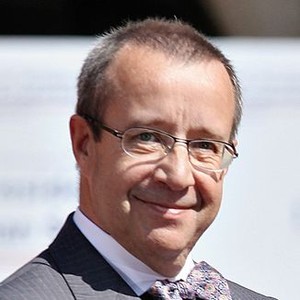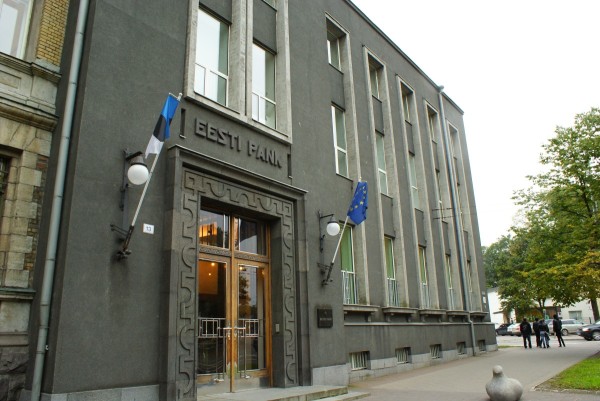
INTERVIEW BY MICHAEL WEISS, Foreign Policy Magazine
There are few ways in which a native New Yorker can feel at home in Eastern Europe. Talking to Estonian President Toomas Hendrik Ilves, who speaks with a slight Jersey accent gained from his time growing up in the Garden State, is one of them.
Ilves, who repatriated to his ancestral Baltic home after the end of Soviet occupation, has served as his country's ambassador to the United States and twice as foreign minister. Now in his second term as president, Ilves has already taken on an aura of avuncular elder statesman, the bow-tied free thinker, and even freer talker, of Europe
Ilves's professional background is in journalism -- he worked for Radio Free Europe in the 1980s -- and he speaks in a mélange of 20th-century intellectualism and 21st-century technocracy. He pokes fun at communism and offers mordant criticisms of ideas and people he doesn't much care for, following them up with arcane details about cyber-security and Estonia's military expansion. The president is a man who likes an intellectual fight: In a prior decade, instead of chivvying Paul Krugman on Twitter, Ilves would have been arguing about dialectics with some greying ex-Trotskyist out of Partisan Review.
He's also one of the few remaining continental leaders who marries social democratic politics with an unapologetically pro-American outlook, and he seems to mourn the fact that he's an endangered political species. So at the margins of the seventh annual Lennart Meri Conference in Tallinn, I sat down with Estonia's president to kibitz about the tensions within the European Union, what Donald Rumsfeld got right, and why Vladimir Nabokov's literature makes him nostalgic for a Russia that never came to be. This transcript has been condensed and edited.
Foreign Policy: When Americans think of the EU, if they think of it at all, they don't see the internal distinctions -- the idea of newer member states in the north having different cultural proclivities from older member states in the south.
Toomas Hendrik Ilves: I'm always amazed at the amount of intellectual effort spent by some Americans to bash the EU. I remember reading a piece, a long piece in Foreign Policy six or seven years ago which was lexically incorrect, written by a constitutional lawyer from the United States. It was when we were doing the EU constitution. It was "Europe's Floundering Fathers."
I just want to point out first of all, in English, it should have been "Foundering," which would have been a better pun, because floundering is just a non-word. And all this effort saying why the EU attempted this stupid, bad constitution...I don't know why they do this. This is an attempt by liberal democracies to somehow establish a structure. Why don't you spend your time attacking authoritarian, kleptocratic regimes, not countries who, for better or worse, are trying to find a way of making liberal democracy work?
FP: I think the prejudice, if it can be called that, is that the "United States of Europe" was not only created to keep Europe from going to war with itself again, but also as a bulwark against American hegemony. But Eastern Europe is showing that you can be a liberal or a social democracy and also be pro-American and want to work in concert with the big, bad superpower.
THI: Just as there are people in the Tea Party movement that rail against Washington in order to get local support, you have people who rail against Washington in France to get local support. A little bit of differentiation would be useful.
Donald Rumsfeld was attacked for two things, but in both cases he was right. First of all, there are known knowns, there are known unknowns, and there are unknown unknowns, which epistemologically is perfect -- it is exactly true. The other thing was the whole New/Old Europe [dichotomy]. And that, in fact, I thought was a very useful distinction.
He was attacked for that, and Old Europe got upset. But there was a commitment of the United States to the Freedom Agenda throughout the 1950s, 1960s and 1970s. There was no European "Radio Free Europe." The U.S. did not badmouth [Polish dissident] Lech Walesa or badmouth Estonia because we rocked the Soviet boat. Western Europe did not have a really great history in Communist-dominated Europe, so why would they be surprised that the 100 million people who then find themselves liberated or actively engaged in liberation actually look toward the United States? This should be a no-brainer.
FP: Britain has cut public spending, several other nations, including Estonia, have done it. In the U.S., there's been a mixture of austerity and Keynesianism. And you had your famous row with Paul Krugman about this, which has been turned into an opera.
THI:I really don't want to get into a debate on austerity for two reasons. One is that, we didn't have any choice. I mean, this is the same thing that Anders Aslund said: [Doing an Aslund impersonation] There was no liquidity! Nothing!
The banks were not giving us money, as Anders also correctly pointed out -- and I've forgotten to mention often -- the [European Central Bank] was not giving us any liquidity. They were giving it to the southern European nations, but not to us. And so, faced with that choice, if I were a Keynesian, [I'd say]: "Well, you borrow money."
But no one is lending you money at rates that make any sense. You would just dig yourself deeper into a hole if they said, "OK, sure, we'll give it to you at 13, 14 percent." I mean, that's insane. Anything over 7 is already damaging. So you don't have a choice. And instead of recognizing we have no choice, [Krugman] just insults people.
The person [Krugman] has no kinderstube [upbringing]. And so to pick on a small, poor country that had no choice and then to just kick them a lot... Austerity for me was the sole option available to us. You know, we did it by the seat of our pants. So here we are, and we're trying to get out of it. And we managed.
FP: There are cultural proclivities that account for the Estonian experience as well. If you have more of a Nordic-style work ethic, you like to show up on time for meetings and so on.
THI: And the other factor is that if you have significant historical memory of mass deportations by the Soviets, you know -- what's a little austerity? [Laughs.]
http://www.foreignpolicy.com/a...
























